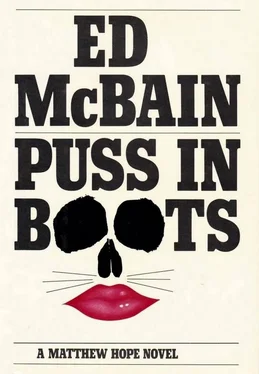And try telling Skye Bannister, via Arthur Haggerty, that Carlton Barnaby Markham, on the night of November twentieth, coincidentally the night of his wife’s brutal murder, had first been watching a movie in a theater called Twin Plaza I, in a shopping mall called South Dixie, had later wandered the mall for a bit, and had then dropped into a bar called Harrigan’s where he’d watched television while sipping a single drink — unless you could come up with someone who could state unequivocally that he or she had actually seen Mr. Markham doing one or more of those things.
So that Friday night at 8:30 p.m., thirteen days before Christmas, Warren pulled his car into the parking lot outside the mall, determined first to find a parking space — which would not be easy with all these Christmas shoppers out doing their thing — and next to find someone who could positively identify Markham’s photograph. This was the kind of legwork Warren had detested when he was a detective in St. Louis, the kind he still detested, tedious, boring, repetitive, and tough on the arches. He found a parking space at last alongside a pickup truck with a shotgun on a rack across the rear window, locked his car, and went into the mall. He knew this would not be easy, and it wasn’t.
He started with the young girl selling tickets at the double theater complex, Twin I and Twin II, asking her if she had been working on the night of November twentieth. The girl was chewing bubble gum. The rush of people buying tickets for the two movies that had started at eight o’clock was over, and she’d been enjoying just sitting there and popping her gum until Warren walked up.
He already knew that on weekdays the movies in these particular theaters ran on a twelve-fifteen, three o’clock, five-thirty, eight o’clock, and ten-thirty schedule. Markham had told Matthew he’d caught the eight o’clock show on the night of his wife’s murder, a Thursday, so at least the schedule checked out. Got out of the theater at around ten-thirty, he’d said, which also checked out. Wandered the mall a bit, then stopped for a single drink at a bar called Harrigan’s, near the mall, got home at about midnight, which was a reasonable time to have made the drive to Pompano Way. But this didn’t check out with Oscar Raddison having seen him in the backyard burying clothes and a bloody knife at eleven-fifteen. The only way Markham could have been at his house at that time was if he’d been killing his wife at ten-thirty or thereabouts, rather than doing all those other things he said he’d done.
“Who wants to know?” the girl said.
Warren flashed the St. Louis potsie.
“Routine investigation,” he said.
“I work every night but Monday and Tuesday,” she said. “Was this a Monday or Tuesday?”
“A Thursday,” he said.
“Then I was here.”
“Recognize this man?” Warren asked, and fished the eight-by-ten blowup out of its manila envelope.
Without even looking at the picture, the girl said, “You gotta be kidding.”
“Take a look at it, okay?” he said.
“When did you say?”
“Thursday night, November twentieth.”
“How long ago was that?”
“Three weeks ago last night,” Warren said.
“And you expect me to remember somebody from then ?”
She popped her gum.
Warren winced.
“Just take a look, okay?” he said.
The girl looked at the picture of Markham and his wife on a beach, the ocean behind them, the sky wide and blue above them.
“Both of them?” she said.
“No, just the man.” And then, at once, “Why? Do you recognize the woman?”
“I don’t recognize either one of them,” she said. “What’d he do?”
“Nothing. Take another look.”
“How many times do I have to look?”
“You didn’t sell this man a ticket on Thursday night, November twentieth?”
“You know how many tickets I sell here every night?” she said. “We’ve got two theaters here, you know how many tickets I sell?”
“How many?” he asked.
“Millions!” she said. “All these people, they’re not even faces to me, they’re voices saying which movie they want to see, and how many tickets, and then they’re hands shoving bills across the counter here, that’s what all these people are.”
“So you don’t recognize him, huh?” Warren said.
“How many times do I have to say it?” the girl said.
“Okay to go inside and talk to the people selling popcorn?”
“You want to go inside, you got to buy a ticket,” the girl said, “badge or not.”
Warren bought a ticket. Never ask, never explain, he thought. Should’ve walked right in. He was getting old.
Older by the minute, as it turned out.
He knew he would strike out with the concessionaires, and he did.
He knew he would strike out all through the mall as well.
Markham claimed that he’d got to Harrigan’s at ten to eleven. It was a five-minute drive from the mall, which meant he’d been wandering around here for fifteen minutes after the movie let out. The chances that anyone had seen him — or would remember having seen him even if they had seen him — were exceedingly slim. But Warren went through the tiresome routine, anyway, consoling himself with the knowledge that he was killing time until he could cruise Harrigan’s; he wanted to get there at the same time Markham claimed to have been there.
And so he checked out the entire mall, moving from store to store and fast-food joint to fast-food joint, rubbing elbows with Christmas shoppers in Bermuda shorts, T-shirts, tube tops, jeans, polyester slacks, floral-patterned short-sleeved shirts, halters, sweat suits, jogging shorts, the haute couture of Florida in December, flashing the picture of Markham and his wife, posing questions to people who often became indignant because he was asking them to remember all the way back to November twentieth, when here it was almost Christmas, the busiest time of the year, did he mind ?
At a quarter to eleven, operating on the theory that regulars of any given bar generally spent the same hours there on any given night, he headed for Harrigan’s.
At 11:32, he got lucky.
Depending upon how you looked at it.
Harrigan’s tried to look like a genuine Irish bar on Third Avenue in New York. It succeeded in looking like a fake Irish bar in Calusa. Never mind the brass rails, and the black leather booths, and the polished mahogany, and the cut-glass mirrors, and the waiters wearing green derbies on their heads and green garters on their shirtsleeves. This was ersatz stuff, as phony as the Santa Claus who’d been shaking a bell inside the South Dixie Mall.
Markham had told Matthew he’d sat at the bar watching television and drinking just one martini before heading home at twenty to twelve, a quarter to twelve, so Warren showed his picture to all three barmaids, each of them wearing the same green derby and green-gartered shirtsleeves the waiters wore, but wearing instead of black trousers very short red skirts and red high-heeled shoes, presumably because this was the holiday season. None of the barmaids had noticed Markham in there on the night of November twentieth or on any other night, for that matter. One of them commented that Markham looked kind of cute, but she admitted she was partial to blond men. Undaunted, Warren began canvassing the patrons sitting at the bar. He got lucky, sort of, when a woman looked at the picture and said, “Oh, sure.”
Warren s eyes opened wide.
“You recognize him?” he asked, astonished.
“I recognize him is right,” the woman said. “Sat right next to me. Ordered a martini with two olives.”
Carlton Barnaby Markham had told Matthew he’d ordered a Tanqueray martini, very dry, straight up, with two olives.
Читать дальше












